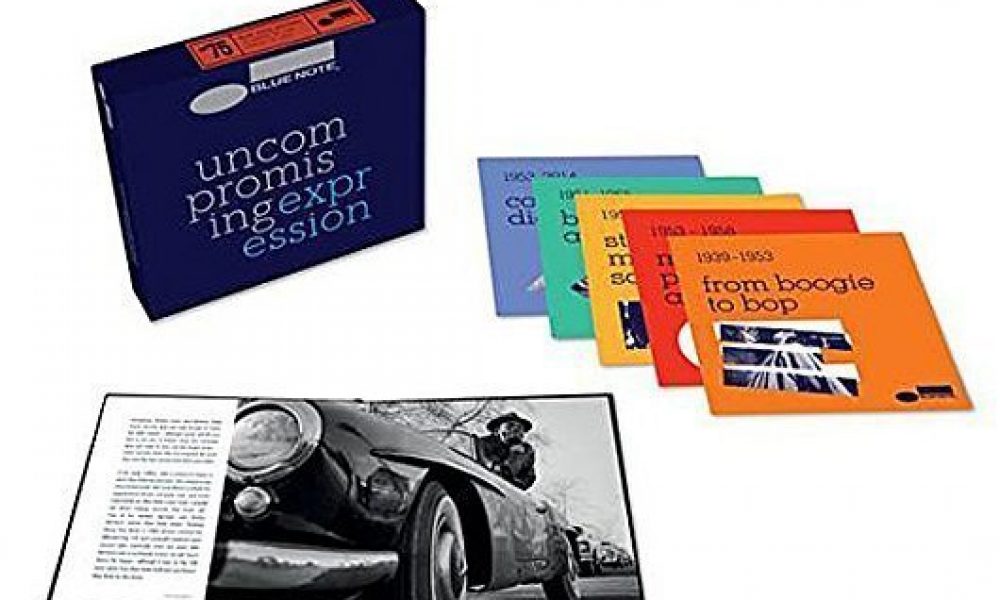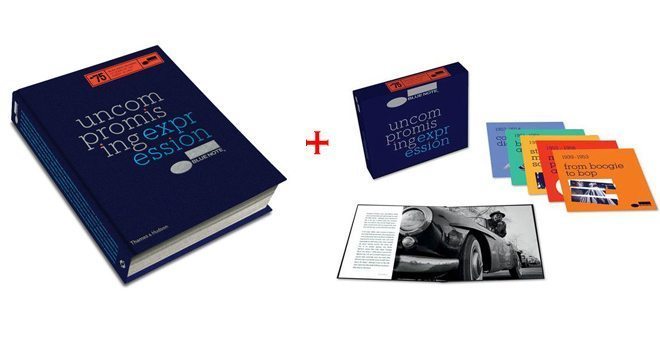Blue Note in 75 Singles


Blue Note is recognised as one of the most important record labels in the history of popular music. Founded in 1939 by Alfred Lion, who had only arrived in America a few years earlier having fled the oppressive Nazi regime in his native Germany, Blue Note has continually blazed a trail of innovation in both music and design. Its catalogue of great albums and long-playing records is for many the holy grail of jazz and yet there was a time when singles, both 78rpm and 45rpm records, were at the heart of the company’s business.
Friday 3 March 1939 was the release date for the first two recordings on the label Lion and two compatriots had decided to name Blue Note. On BN 1 were two slow blues tunes, ‘Melancholy’ and ‘Solitude’ that were takes; BN2 consisted of two numbers by Ammons with a quicker tempo, ‘Boogie Woogie Stomp’ and ‘Boogie Woogie Blues’. With no real distribution in place, Lion offered these records by mail order at $1.50 each, which was double the standard retail price for a ten-inch record. Lion pressed just twenty-five of each disc – hardly an ambitious release schedule.
Years later, Alfred Lion would recall the huge challenge Blue Note faced: ‘There was nothing in ’39. No {music trade] books where you could check out things. Nothing. You had to go by your wits.’ Through his friendship with Milt Gabler, Lion persuaded Commodore Music Shop in Manhattan to sell Blue Note’s records. H. Royer Smith on Walnut Street Philadelphia, trading since 1907 and one of America’s oldest record stores, also agreed to take them, as did David Dean Smith in New Haven, Connecticut.
Two releases do not make a record label, and five weeks after their first two records came out Lion was back in the studio for Blue Note’s second session. Sidney Bechet, who Lion had briefly met in Berlin, was there and he recorded a version of George Gershwin’s ‘Summertime’. This was a pivotal moment in the history of Blue Note. Bechet turns in one of the most beautiful readings of this most beautiful song. Issued as BN6, this was not only a fabulous record, it also became the label’s first hit with as many as thirty copies a day sold at Commodore Music Shop alone. This changed the fortunes of the label. Blue Note Records began recording more sessions.
In July 1944, Blue Note took its first tentative steps towards modernity when a new name appeared on a studio log: that of twenty-five-year-old tenor saxophonist, Ike Quebec. In one of the magazine’s very earliest mentions of the label, Billboard acknowledged that Lion and Blue Note recognised ‘across the tracks jazz as a coming force.’
Be-Bop was the latest craze in jazz and for a while Blue Note’s recordings seemed out of step with fashion, being more firmly rooted in traditional jazz. Quebec had become something of an unofficial A & R man to the label. The first of the ‘new’ artists to record was singer (and Errol Flynn’s former chauffeur) Babs Gonzales, who embraced the basics of bop. At his first session in 1947, Gonzales – whose real name was Brown – recorded ‘Oop-Pop-A-Da’, as 3 Bips and a Bop.
Quebec also helped introduce Lion and Francis Wolff, another exile from Germany who became his partner and took the wonderful photographs which graced so many of the Blue Note albums, to the music of Thelonious Monk. Monk recorded for Blue Note for the first time at WOR Studios on 15 October 1947 and his first 78-rpm release from that session, BN 542, was, appropriately, ‘Thelonious’.
Before long other names from the world of Bop began recording for Blue Note – there were trumpeters Howard McGhee and Fats Navarro, pianist Bud Powell and Wynton Kelly and in 1952 Miles Davis recorded for the label. Also in 1952, 24-year-old Horace Silver had his first single, ‘Safari’ issued by Blue Note.
Throughout the late 1940s and early 1950s times were tough for Blue Note and throughout this time the jukebox was key to selling jazz, and as many of them were switching to the 45 rpm format Alfred Lion was quick to invest in this new format. Blue Note’s first 45 rpm single was ‘Message From Kenya’ by Art Blakey and Sabu, a purely percussive recording that came out in early 1954.
In 1955 ‘The Preacher’ by Horace Silver became another big seller for the label and shortly thereafter organist Jimmy Smith signed to Blue Note and became another big seller through exposure on the jukeboxes and sales of 45s. Throughout the 1950s the list of artists releasing Blue Note singles was impressive – Lou Donaldson, J.J. Johnson, Sonny Rollins, Kenny Burrell, Hank Mobley, Curtis Fuller and even John Coltrane who’s one Blue Note album, Blue Train had the title cut edited to fit on a 45.
A big selling single could bring in big money and Lion tried different ways of securing that elusive hit. He paired singer Bill Henderson with Horace Silver to record a vocal version of the latter’s ‘Senor Blues’. He also released 45 rpm only recordings, notably by Bill Henderson and Jimmy Smith, Sonny Clark and Bennie Green.
As new names were added to the Blue note roster, so they released singles. There was Sonny Clark, The Three Sounds, Cannonball Adderley, Dizzy Reece, Jackie McLean, Freddie Hubbard, Stanley Turrentine, Tina Brooks and Grant Green during the latter years of the 1950s and early 1960s.
Finally in 1962, just as Jimmy Smith was about to leave Blue Note for the other big name in jazz recording, Verve Records, he had a hit on the Billboard bestseller list when ‘Midnight Special parts 1 & 2’ went to No.69 on the pop charts, several more records also made the lower reaches of the chart. Then in 1964 trumpeter, Lee Morgan also had a hit with ‘The Sidewinder’.
In May 1966, Liberty Records purchased what Billboard referred to as ’the Cadillac of the jazz lines’. Alfred Lion had decided to sell his 26-year-old record label to one that had been in business for just about a decade.
By 1970 Blue Note had gone through many changes, Lion had left and jazz, in general, was finding it tough. Jazz needed to find a new direction home and once it did it was not to everyone’s liking. Donald Byrd, who had been recording for Blue Note since 1956 began taking his music in something of a new direction, and while many did not like it, there was definitely acceptance from the public for his award-winning album Black Byrd, which made the Billboard charts, as did the title song that made the lower reaches of the singles chart. In a similar vein Bobbi Humphrey, Ronnie Laws, and Marlena Shaw made records that sold well enough to make the R&B charts – although some will tell you this is not jazz it helped keep the company alive and able to ride out the tough times – many records from this era inspired the Acid Jazz and Hip Hop movements that came later.
In the early 1980s, after a period of hiatus in which Blue Note lay dormant, the company was resurrected and one of the earliest signings was Bobby McFerrin whose Blue Note debut ‘Thinking About Your Body’ in 1986 almost cracked the Billboard top 100. In 1993 Us3’s debut Blue Note album, Hand on the Torch featured eclectic sampling from, among others, Thelonious Monk, Donald Byrd, Art Blakey and the Jazz Messengers, and Horace Silver. In January 1994 the album entered the Billboard chart and made it to No.31, with ‘Cantaloop (Flip Fantasia)’ making the US singles chart top ten and selling a million copies in the process.
Three years into the label’s seventh decade, along came an artist who took Blue Note executives by surprise with a record that was both controversial and brilliant – but was it jazz? To some, sitar player Ravi Shankar’s daughter, Norah Jones, was anything but, however, her single, ‘Don’t Know Why’ made No.30 on the Billboard chart and later won a Grammy and her album Come Away With Me marked the beginning of a shift in emphasis for Blue Note Records.
With singles per se becoming less important to record companies in the era of downloads they are still important in ‘selling’ an album, through radio plays and as promotion for CDs. By the second decade of the 21st century a man who admits, ‘I’ve spent all my life avoiding having a job, which is why I became a musician’, was invited to take up the newly created role of Chief Creative Officer at Blue Note. But this was no ordinary job and Don Was, musician, songwriter and Grammy award-winning producer, was an inspired choice.
Under Was’s leadership, Blue Note Records has entered a new era of “uncompromising expression.” The last five tracks in the box set are all ones that have been used to promote album releases by Blue Note artists. The variety and integrity of the music is a testament to Was’s creative strategy. Any label that can comfortably release Robert Glasper, Jose James, Rosanne Cash, Gregory Porter and Derrick Hodge has to be taken seriously.
If ‘Uncompromising Expression’ needs further definition then this is it– ‘Just do it. You don’t have to describe it’. For Don Was, ‘It’s a great contribution to society to make great records’. It’s what Blue Note has done for three-quarters of a century. Not just great albums, but also great singles.
Can you dig it?
The 5CD, 75 track box set accompanies the newly published book from Thames and Hudson, Uncompromising Expression – 75 Years of Blue Note Records.
Buy Blue Note’s Uncompromising Expression 75 Singles on Amazon.
The No.1 Jazz Bestseller book, Uncompromising Expression by Richard Havers is available on Amazon.













Ray Hunter
November 30, 2014 at 3:06 pm
The book is in a cupboard ready for Christmas day so I have been informed, the first four disc are interesting, but the last one i would not thank you for, nobody on it who’s playing is worth a light, Glasper and Porter are both rubbish and not Jazz. players and never will be..